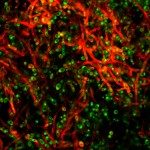Lien vers Pubmed [PMID] – 12046590
Mol. Microbiol. 2002 May;44(4):1001-16
The role of cAMP signalling during germination of asexual spores (conidia) of the filamentous fungus Aspergillus nidulans was investigated. A. nidulans strains defective for adenylate cyclase (CyaA) or for the functionally overlapping cAMP-dependent protein kinase (PkaA) and newly characterized SchA protein kinase, homologous to Saccharomyces cerevisiae Sch9, show altered trehalose mobilization and kinetics of germ tube outgrowth, in addition to other defects in colony formation. cAMP-dependent trehalose breakdown is triggered by the addition of a carbon source independently of further catabolism, suggesting that cAMP signalling controls early events of conidial germination in response to carbon source sensing. Additional results suggest that cAMP has targets other than PkaA and SchA and that PkaA retains activity in the absence of cAMP. Conversely, PkaA regulates cAMP levels in A. nidulans because these are elevated by approximately 250-fold in a strain that lacks PkaA. Furthermore, analysis of mutant strains impaired in both adenylate cyclase and RasA GTPase previously implicated in the control of A. nidulans spore germination suggested that RasA and cAMP signalling proceed independently during germination in A. nidulans.


